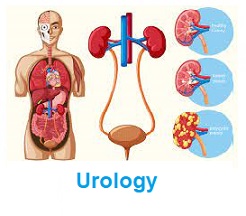 Helpline Number: 01666-227785
E-mail : sparshhospitalsirsa@gmail.com Bishnoi Nursing Home Complex ,Gandhi Market ,Sirsa
Helpline Number: 01666-227785
E-mail : sparshhospitalsirsa@gmail.com Bishnoi Nursing Home Complex ,Gandhi Market ,Sirsa 
Urology is that branch of medical science which deals with problems of the urological tract or more specifically the organs responsible for producing and excreting urine from the body. These include the kidneys, ureters, urinary bladder and urethera. In addition in males, problems of the prostate and external genital organs are also seen by urologists. Andrology or male infertility is also partly assessed by urologists specially trained for this sub-specialty of infertility.
Our specialist is available on prior appointment in the OPD.
Facilities available here are:
Medical and surgical treatments for urinary problems of both male and female patients ? related to disorders of urethra and urinary bladder, ureters and kidney
Testicular biopsy and aspiration
Endoscopic and surgical management of prostatic enlargement
Urology is a subspecialty of surgery that deals with disorders of the genital and urinary systems in men and women. This includes everything from the kidney, bladder, prostate gland, etc. Urology was the first sub-specialty to break away from general surgery, at the turn of the century and has a long history.
We Treat stones of the kidneys, urethra, bladder, urinary incontinence, cancers of the kidneys, bladder, testicular disorders, prostate disorders including prostatitis and BPH (benign enlargement of the prostate), problems with sexual function and infertility in men, growth within the adrenal gland (a small gland on top of the kidneys), kidney transplants, urological problems in children (which includes a wide variety of abnormalities often present from birth), etc.
Urology
Urology is a surgical specialty which deals with diseases of the male and female urinary tract and the male reproductive organs. Although urology technically is a surgical specialty, a urologist must be knowledgeable in other areas including internal medicine, pediatrics, and gynecology because of the wide variety of clinical problems that a urologist deals with. The American Urological Association has identified seven subspecialty areas
Pediatric Urology
Urologic oncology (cancer)
Renal transplantation
Male infertility
Calculi (urinary tract stones)
Female urology (urinary incontinence and pelvic outlet relaxation disorders)
Neurourology (voiding disorders, urodynamic evaluation of patients and erectile dysfunction or impotence)
Endourology
Endourology is also known as minimally invasive urologic surgery or laparoscopic surgery. Endourology, for example, can be used to locate and remove small kidney stones. Stones may be taken out or fragmented using tiny instruments inserted into the body through such areas as the urethra, bladder, ureter, and kidney.
Endourology, for example, can be used to locate and remove small kidney stones.
Stones may be taken out or fragmented using tiny instruments inserted into the body through such areas as the urethra, bladder, ureter, and kidney. In addition to treatment, doctors can help determine what is causing the kidney stones and help identify ways to prevent further stones from forming. Thin, flexible instruments including lasers, graspers, miniature stone retrieval baskets, special scalpels, and cautery, can be used to perform surgery without creating any incisions at all. Nearly all endoscopic procedures can be done on an outpatient basis.
Pediatric urologists
Pediatric urologists are surgeons who can diagnose, treat, and manage childrens urinary and genital problems.
If your child has an illness or disease of the genitals or urinary tract (kidneys, ureters, bladder), a pediatric urologist has the experience and qualifications to treat your child.
Evaluation and management of voiding disorders, vesicoureteral reflux, and urinary tract infections that require surgery
Surgical reconstruction of the urinary tract (kidneys, ureters, and bladder) including genital abnormalities, hypospadias, and disorders of sex development
Surgery for groin conditions in childhood and adolescence (undescended testes, hydrocele/hernia, varicocele).
Evaluation and surgical management of kidney stone disease
Surgical management of tumors and malignancies of the kidney, bladder, and testis
Evaluation and management of urological tract problems identified before birth
Evaluation and management of urinary tract problems associated with neurological conditions such as spina bifida
Children are not just small adults. They cannot always say what is bothering them. They cannot always answer medical questions, and are not always able to be patient and cooperative during a medical examination.
Pediatric urologists are trained to focus care on the special needs of children and their parents even on potentially sensitive and embarrassing subjects related to genitalia and voiding problems. They know how to examine and treat children in a way that makes them relaxed and cooperative. In addition, pediatric urologists often use equipment specially designed for children. This helps create a comfortable and non-threatening environment for your child.
If your pediatrician suggests that your child see a pediatric urologist, you can be assured that he or she has the widest range of treatment options, the most extensive and comprehensive training, and the greatest expertise in dealing with children and in treating childrens urinary tract disorders.
